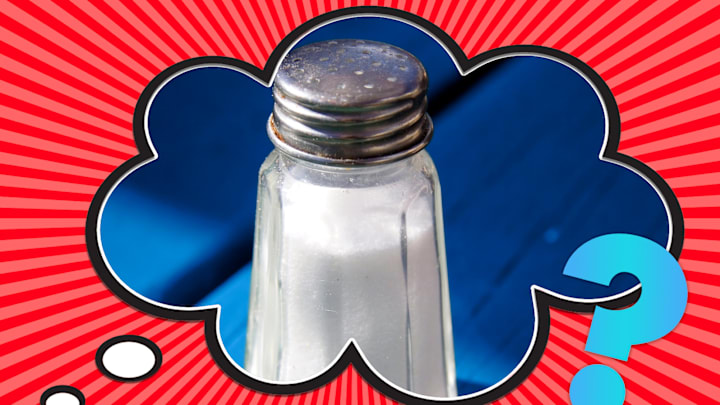Sometimes your dinner companion is so uninteresting that you might begin to read the label of your table salt. If this happens to you, you might grow curious over why the salt is labeled as being “iodized.” What does that mean, and what’s the benefit?
Adding iodine to salt has traditionally been a slightly sneaky way of making sure consumers have a sufficient amount of the micronutrient in their diet, a practice not dissimilar to adding fluoride to water. Iodine isn’t made by the body, but it’s needed in small quantities in order for the thyroid gland to function properly. It allows the thyroid to make thyroxine, a hormone that helps regulate many bodily functions, including mental acuity. If iodine is lacking, thyroid dysfunction can occur. This can lead to thyroid swelling (a goiter), mental impairment, or even birth defects.
Iodine is found in naturally in coastal areas, and we get the nutrient from a variety of marine foods, including fish and seaweed (dairy products and some grains are other common sources). So why add it to salt? In the early 20th century, iodine deficiency was more common; so were concerns that the iodine found in foods wouldn’t be enough to support the thyroid. Some areas of the U.S., like the interior Northwest, were even known as “the goiter belt” because they lacked coastal food sources. Emulating the Swiss, U.S. officials added iodine (in the form of potassium iodate or iodide) to table salt.
The positive effects were quickly noticed: In Michigan, where iodized salt was first sold starting in 1924, the number of folks with goiters fell from 30 percent to just 2 percent over a 10-year period.
Thanks to a more varied diet, however, Americans are rarely at risk for iodine deficiency today. In general, iodine from salt isn’t necessary. One exception is pregnant women, who are sometimes at risk of low levels and should take vitamin supplements if recommended by their doctor. Additionally, people who don’t eat much fish or drink milk might want to be mindful of sourcing iodine elsewhere.
The continued presence of iodized salt is more of a cheap insurance policy than anything. For people whose diets may not supply iodine, some sprinkles of salt should stave off the effects of being deficient. Because iodine is cheap—perhaps as little as $1 per ton of salt—and generally safe to consume in moderation, it’s likely to remain part of your dinner table.
Have you got a Big Question you'd like us to answer? If so, let us know by emailing us atbigquestions@mentalfloss.com.
